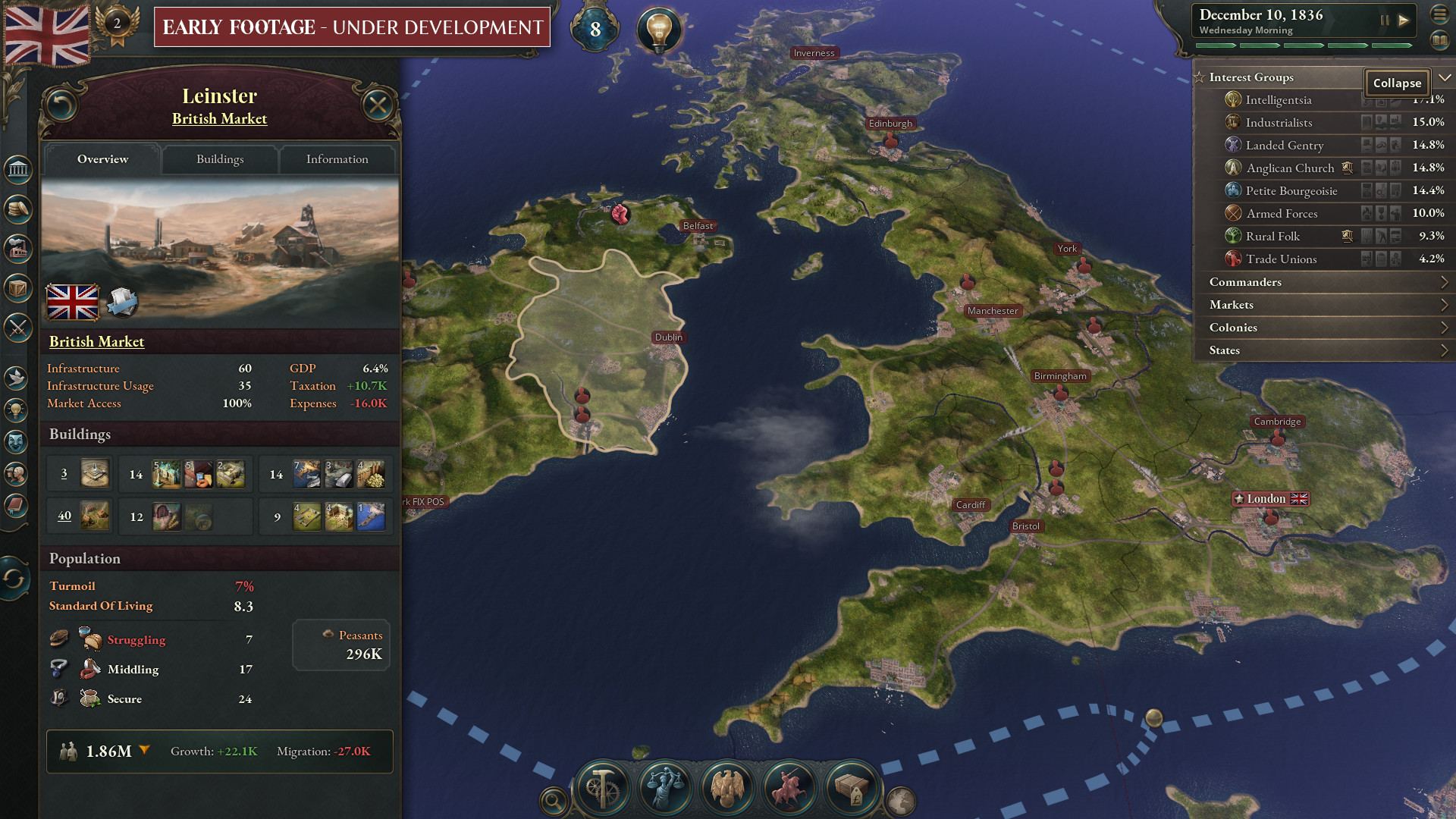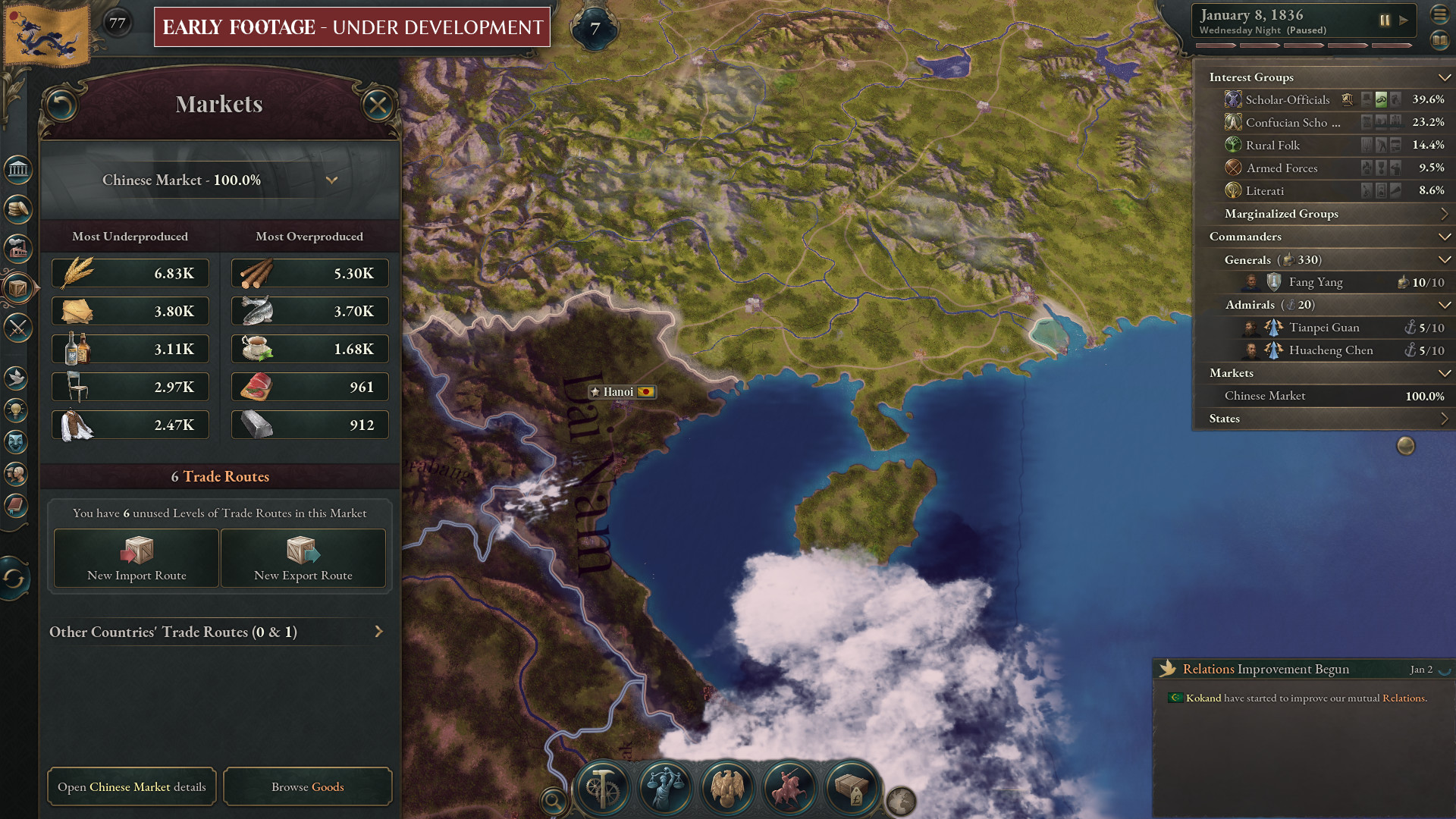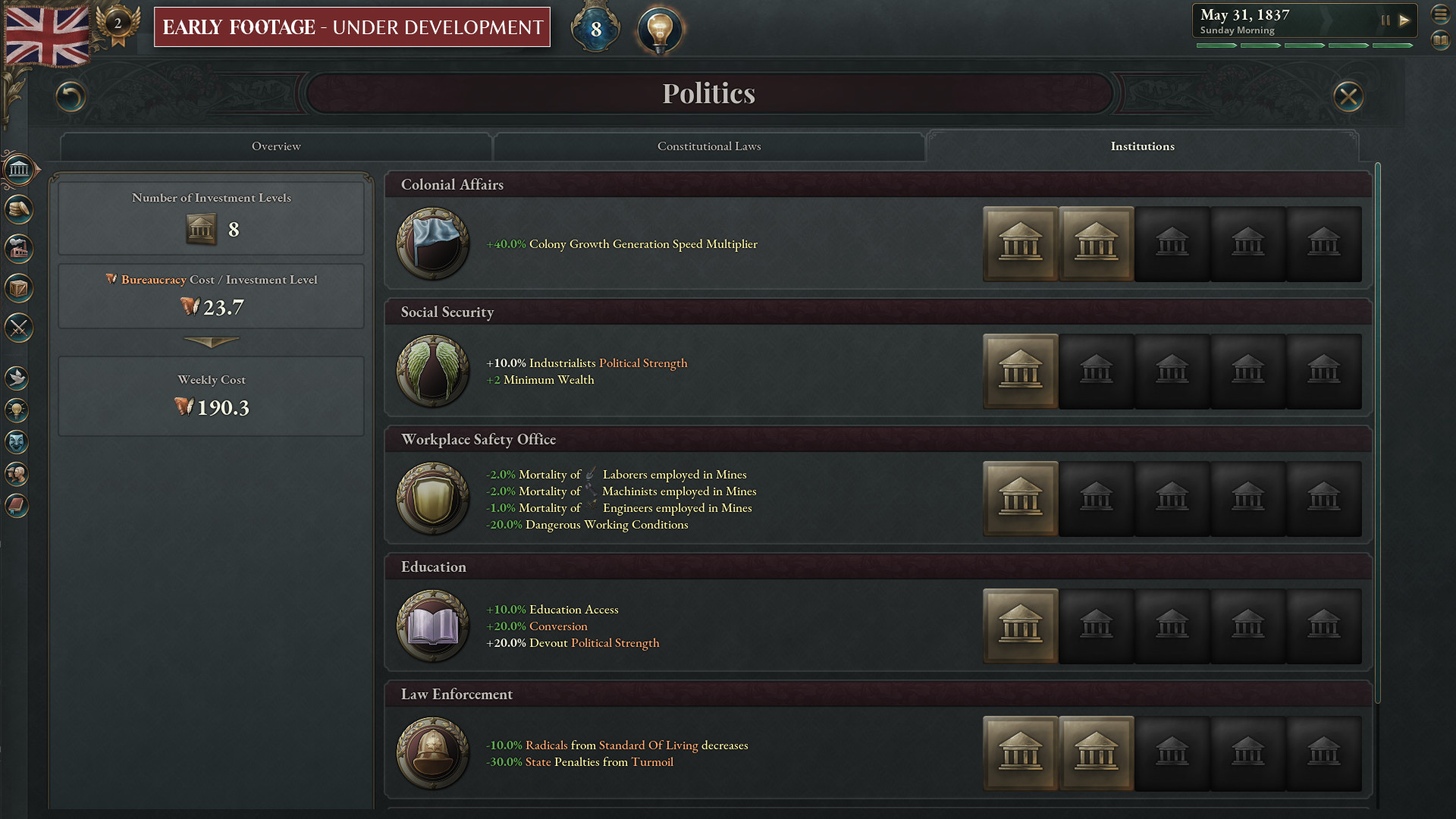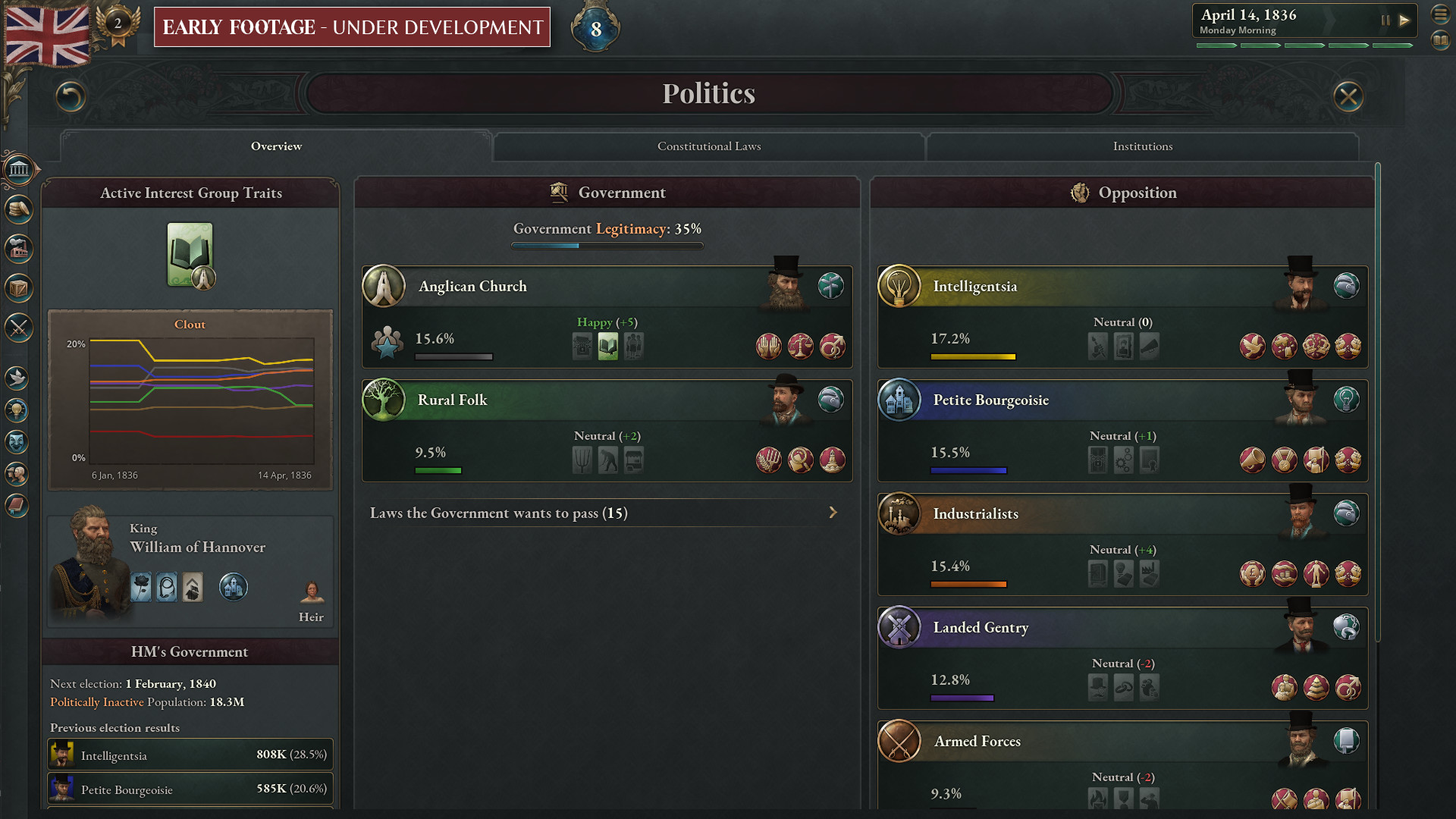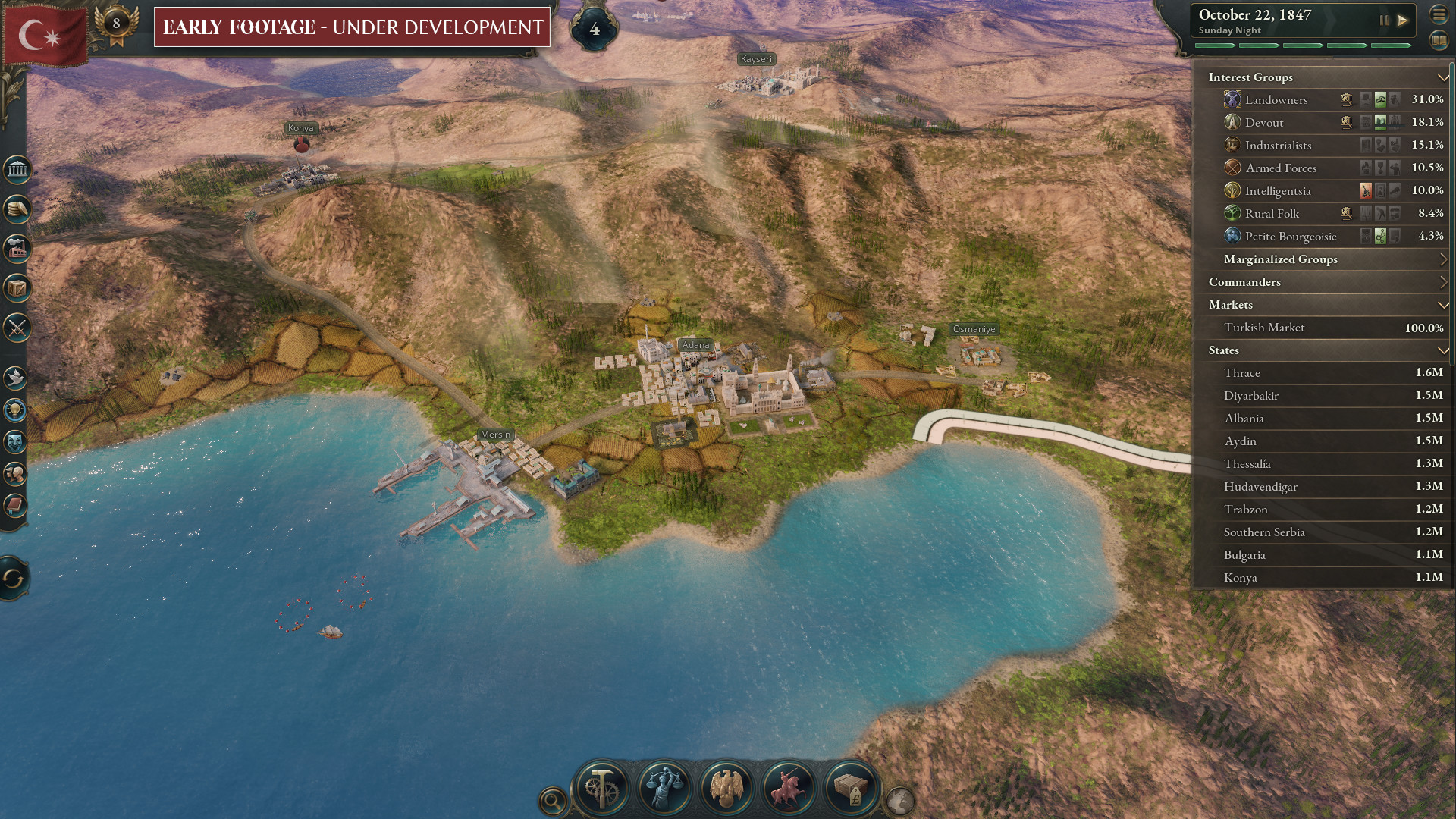SHAPE A GRAND TOMORROW
Paradox Development Studio invites you to build your ideal society in the tumult of the exciting and transformative 19th century. Balance the competing interests in your society and earn your place in the sun in Victoria 3, one of the most anticipated games in Paradox’s history.THE ULTIMATE SOCIETY SIMULATOR
- Lead dozens of world nations from 1836-1936. Agrarian or Industrial, Traditional or Radical, Peaceful or Expansionist... the choice is yours.
- Detailed population groups with their own economic needs and political desires.
- Reform your government and constitution to take advantage of new social innovations, or preserve the stability of your nation by holding fast to tradition in the face of revolutionaries.
- Research transformative new technology or ideas to improve your national situation.
DEEP ECONOMIC SYSTEM
- Expand your industry to take advantage of lucrative goods, taxing the profits to improve national prosperity.
- Import cheap raw materials to cover your basic needs while finding new markets for your finished goods.
- Secure vital goods to fuel your advanced economy and control the fate of empires.
- Balance employing available labor force with the needs for new types of workers.
PLAY ON A GRAND STAGE
- Use your diplomatic wiles to weave a tangled global web of pacts, relations, alliances, and rivalries to secure your diplomatic position on the world stage.
- Employ threats, military prowess and bluffs to persuade enemies to back down in conflicts.
- Increase your economic and military strength at the expense of rivals.
- Accumulate prestige and the respect of your rivals as you build an industrial giant at home or an empire abroad.

Hello and welcome to another Victoria 3 development diary! Today well be returning to more mechanics-oriented dev diaries, starting out with a very important mechanic for the economic development of your 19th century nation - the construction of new Buildings .
Construction in Strategy games tends to follow a pretty typical formula: you save up money, order a construction and pay a lump-sum cost, wait some time, and the new building pops into existence. As mentioned in Dev Diary 12 , however, the vast majority of expenses in Victoria 3 are not lump-sum costs but applied over time as part of your national budget. So how does it work instead? To answer that, theres a few concepts we need to cover, namely Construction Capacity, the Construction Sector and the Construction Queue.
Lets start then with Construction Capacity - which is actually just named Construction in-game, but were calling it Construction Capacity here to differentiate it from the overall concept of building things. This is a country-wide value of your nations overall ability to make progress on new buildings in a single week. For example, if your country produces a total of 100 Construction and a new Textile Mill costs 300 Construction, youd expect to be able to build that Textile Mill in a total of 3 weeks. However, its a little more complicated than that, as well see below when we explain the Construction Queue.
With Construction Sectors present in Lower Egypt, Matruh, Sinah and Palestine, the Egypt in this screenshot generates a respectable amount of Construction for the early game, though their finances may struggle a bit to fund it all.
So, how do you produce Construction? This is where the Construction Sector comes in. All countries get a tiny amount of free Construction Capacity to ensure that you never get stuck in a situation where you need Construction Capacity to expand your Construction Sector but need a Construction Sector to get Construction Capacity. This amount is woefully small though, and wholly insufficient even for a small nation, so if youre not planning to run a subsistence economy long-term you will definitely need to invest in a proper Construction Sector by building more Construction Sector buildings in your states.
Mechanically speaking, the Construction Sector is a type of government building which employs people and uses goods to output Construction Capacity with a variety of different Production Methods, ranging from simple Wooden Buildings to modern arc-welded Steel and Glass structures. It does work a little bit differently though, in that the amount of Goods used by the Construction Sector each week depends on the actual need for Construction Capacity - if your Country is producing a total of 500 Construction Capacity, but will only need 250 for ongoing projects that week, the total usage of Goods in the Construction Sector is cut by half - though you still have to pay the wages of all the Pops employed there.
More advanced methods of construction are expensive and require complex goods - but you will find it difficult to build up a true industrialized economy without them.
Ultimately, what this means is that how fast you can build things depends entirely on how much money, goods and research youre willing to throw into your Construction Sector - having only a handful of Construction Sector buildings using only Wood and Fabric will certainly be cheaper and easier than building up a sprawling Construction Sector using Steel-Frame Buildings, but will naturally limit your ability to industrialize your nation.
So then, how does Construction Capacity actually turn into finished buildings? This is where the Construction Queue comes in. Each country has a nation-wide Construction Queue, with each project in the Queue corresponding to building a single level of a Building in a specific State. For example, a Construction Queue in Sweden might look like this (all numbers are examples):
[olist]
Each week, your produced Construction Capacity is allocated to projects in the Queue in order of priority, with a maximum speed at which projects can proceed (so its never possible to, say, build the Panama Canal in a single week). Using the above construction queue as an example, lets say the maximum progress that can be made each week is 50, and Sweden is producing 112 Construction Capacity.
This would mean that projects 1 and 2 would both be allocated 50 Construction Capacity, while project 3 would get the left-over 12 and projects 4 and 5 would not progress at all in that week. It would take 5 weeks for entry 1 to finish at that pace, but after only 3 weeks, project 2 will be down to only 5 progress needed, and so most of the Construction Capacity allocated to it will be freed up for other projects. This also means that project 2 will actually finish before project 1, which is perfectly normal, as different buildings require different amounts of Construction Capacity to complete - its easier to build a Rye Farm than a Shipyard.
With just above 40 construction output and the help of some local Construction Efficiency bonuses, this country is able to make rapid progress on the Wheat Farms and Iron Mines at the top of the queue and even get a bit of weekly extra progress on the Logging Camps.

If all this seems confusing, dont worry! All you really need to understand is that the more Construction Capacity you have, the faster things go - but a large Construction Sector will need to be kept busy with multiple projects at once if you want to use its entire output.
There is one more important factor to Construction, which is a modifier called State Construction Efficiency that governs how effective each point of Construction Capacity you put into building Buildings in a State is. For example, a state with a +50% bonus to State Construction Efficiency means that every Construction Capacity allocated to projects in that State actually results in 1.5 progress on said projects, while a malus of -50% would reduce it to 0.5 actual progress.
A few factors that will increase or decrease State Construction Efficiency are:
Industrializing the Amazon Rainforest is neither easy nor cheap.

Thats it for today! Join us again next week as we continue talking mechanics, on the topic of Market Expansion!
Minimum Setup
- OS: TBC
- Processor: TBC
- Graphics: TBCSound Card: TBC
Recommended Setup
- OS: TBC
- Processor: TBC
- Graphics: TBCSound Card: TBC
[ 6374 ]
[ 5785 ]
[ 751 ]
[ 2194 ]

